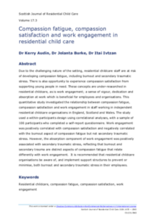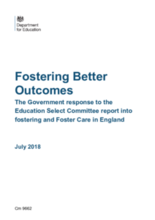

Displaying 1031 - 1040 of 1648
This study provides UK evidence for the relationship between kinship care and deprivation and examines how the welfare state frames kinship care in policy and practice.
This paper presents findings from a longitudinal study with seventy-five carers was conducted over twenty months, comparing placements that broke down to those that did not an identifying personal and family factors that increase the likelihood of foster placement success.
CELCIS is looking to recruit a child rights/welfare professional, to help shape and deliver their international work: securing the global implementation of the UN Guidelines for Alternative Care, and realising children’s rights through developments in policy, systems and practice.
This qualitative interview study with custodians and young people who have experienced custody transfer highlights that who counts as family and as a parent is ambiguous.
The Joint World Conference on Social Work, Education and Social Development (SWSD) 2018 will explore the theme ‘Environmental and Community Sustainability: Human Solutions in Evolving Societies’.
The aim of this qualitative grounded-theory situational study was to explore experiences of social networks among unaccompanied minors (UM) and the significance of those networks for becoming established in Sweden, based on data from in-depth interviews with 11 young persons.
This quantitative study investigated the relationship between compassion fatigue, compassion satisfaction and work engagement in staff working in independent residential childcare organisations in England, Scotland and Wales.
This paper sets out the government’s response to two reports into foster care: The Education Select Committee Inquiry into Fostering and the Foster Care in England report, an independent review commissioned by the Department for Education. The response describes the government’s vision for foster care and improvements for the system, based on the recommendations of the two reports.
The goal of this contribution is to bring to light some systemic applications of organizational power that occur within the child protection system in Iceland.
The aim of the article is to describe and discuss how issues related to schooling and educational achievement are recognized and addressed in social services case files for children and young people placed in out-of-home care (OHC) in the city of Gothenburg, Sweden.



